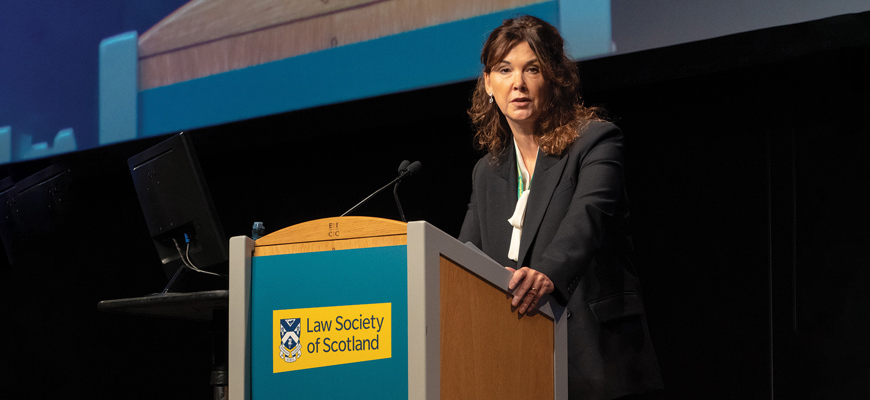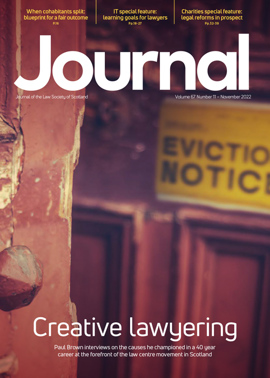Back in the real world

“The rule of law cannot be upheld, where, as a society, we cannot secure justice for certain groups.” So declared Lord Advocate Dorothy Bain KC, giving the keynote address at the opening of the Society’s 2022 Annual Conference, which returned on 21 October to the Edinburgh International Conference Centre.
Delegates retained the option to join online, which has been the only way to hold the event for the past two years, but yes, it did feel very good to be meeting people face to face again after so long facing a screen.
Gender-based violence
Taking as her title “Upholding the rule of law: Achieving fairness in the justice system”, the Lord Advocate devoted much of her talk to the related themes of violence against women and girls, and historical child abuse – which together mean “a huge number of people” who have not experienced justice.
With sexual violence now accounting for over 70% of High Court casework, she recognised both the “severe and lasting impact” on victims and their families, and the continuing concerns about the way such cases are prosecuted, including the low conviction rate in trials for rape and attempted rape (51%, compared to 91% for trials overall).
These concerns should be “a clarion call to the profession”, she continued. “As head of the system of prosecution in Scotland, I am keenly aware of the need to transform the way we prosecute sexual offences and domestic abuse. Dealing with these cases is the challenge of our generation.”
Bain proceeded to describe several Crown Office initiatives, including the current review by Susanne Tanner KC of how prosecutors deal with reports of sexual offences; increased specialist training; work on developing a “single point of contact” approach to help support victims; and piloting videorecorded interviews of rape complainers, and forensic medical examinations by experienced nurses.
On the wider front, the Scottish Government is taking forward various recommendations by Lady Dorrian (proposals regarding judge-only trials would however require “extensive consultation and careful consideration”); non-means-tested legal aid is available for complainers if recovery is sought of sensitive personal records – something Bain wanted to highlight as she believed some lawyers remain unaware of this; consultation is coming on the Kennedy report on misogyny offences; and Police Scotland is taking a multi-agency approach to violence against women.
Other rule of law issues
Regarding historic child abuse, the Lord Advocate stated: “As with violence against women, the widespread and consistent denial of justice to those who were abused, is a failure to uphold the rule of law.” The true extent of the problem was only coming to light with the work of the Scottish Child Abuse Inquiry, in response to which COPFS was reviewing cases previously reported and, where appropriate, instructing specialist teams within Police Scotland to investigate further.
Referring also to the “public health emergency” of drug deaths, she stated that the rule of law required that law and the criminal justice system serve every member of society. Changing understanding of crime and its causes has “underlined the need to find innovative solutions”: hence her revision to guidelines on the police warning scheme, to allow the police to take decisions in relation to some types of offending. Prosecutors will regularly review procedures and continuously seek innovative solutions to provide justice.
Bain’s concluding passage focused on the role of lawyers in upholding the law. She recognised both the commitment of her own service and “how incredibly committed defence agents and defence counsel are to providing progressive and humane justice by ensuring the respect of the most basic of rights – the right to a fair trial”.
Taking a global perspective, she added: “As the situation unfolds in Ukraine, it has never been more important to adhere to the international rules-based order, to the rule of law. Now more than ever, we need strong institutions both in Scotland and abroad, which uphold the rule of law. And crucially, we need lawyers and citizens to hold those institutions to account.” The Ministerial Code was mentioned as setting out the overarching duty to comply with the law, including international obligations.
Returning to her main theme of the justice system delivering for women and girls, the Lord Advocate acknowledged that society as a whole had to address the violence problem, but added: “I think the legal profession itself has a crucial role to play. As lawyers, we are perhaps most well-versed in the principles of law, justice and fairness. That is why we must be at the forefront of the debate on new and innovative models to achieve justice in both our legislation and in our courts. Accepting the status quo is no longer an option.”
Ethical dimension
The first-panel session was expansively titled “Professional Ethics, the Rule of Law and International Conflict”. Advocate Frances McMenamin KC and former International Criminal Court judge Sir Howard Morrison KC took up the challenge.
“The most important asset any lawyer has is integrity”, was McMenamin’s opening shot. Honesty cannot be emphasised enough: if you lose your reputation, you will be lucky to get it back – and if you can’t be trusted by other professionals, what good is that to the client?
Turning to the rule of law, she stressed its role in ensuring that government is not above the law – and the importance of an independent judiciary upholding it. She had a dig too at the possible removal of juries from a limited category of sexual offence cases: could we still ensure fair play for all?
Morrison’s perspective was that fundamental to the rule of law is not just the mechanism, but the fairness of proceedings. The ICC had to counter the view held by some that it would only be judged a success if it had a high conviction rate. Its cases attracted great publicity, and nothing less than a fair and proper investigation would do.
Asked how we could promote to the wider public the importance of the rule of law, both agreed this was difficult. McMenamin thought it really a PR exercise and it was important for the courts to be open again. Morrison described defence counsel’s duties to the client, the court and the rule of law as “joined at the hip”. Prosecutors and judges also had to ensure a fair trial. (As an aside, he let it slip that as an outsider he would be sorry to see the end of the not proven verdict.)
Trainee talk
What might we learn from the second panel session about trainees and training? Large firms and organisations recognise the “multidimensional” nature of a good traineeship, helping create a sense of belonging in the trainee and an awareness of the business’s ethos, and its commercial drivers, along with one’s own personal skills and the need to ask questions and be receptive to feedback. And they offer further opportunities, for example taking part in specific interest groups in the organisation. One business formulates its package as a “delta [three cornered] model” of practice, process and people skills.
Another speaker highlighted the “real differences” in how generations learn, and interact with each other – it’s a challenge for more senior people to keep up with what works for today’s emerging lawyers! Though sometimes their expectations do have to be managed, it was generally felt that the calibre of trainees is very high today, candidates often having previous commercial or paralegal experience. Another point: hybrid learning is here to stay, whether or not we have yet fully discovered its effects, but supervision remains critical.

Wellbeing in the law?
“Wellbeing and its compatibility with working in the law” was the somewhat disconcerting title of the final main session, a panel discussion featuring two private practice lawyers (at different career stages) and a procurator fiscal. Were they really suggesting that the two are incompatible? Fortunately no, but the team did set out to scotch a few myths, which presumably enjoy some currency.
First, “We all need to be more resilient to have a successful career in law.” If that means acceptance of long hours, it seems today’s new lawyers are more likely to dig their heels in, which the panel reckoned was a good thing. So is the fact that students are perhaps more prepared to share with someone if they feel they are struggling: it shows insight, and opens up the possibility of support. We should also be thinking in terms of organisational as well as individual resilience, meaning the ability to reach out and offer support.
Myth 2 was “Solicitors don’t make good natural managers and leaders.” Why shouldn’t they? “Management in its simplest form is about the use of resources in order to achieve objectives”, it was said. Putting yourself in the other person’s shoes works in the management as well as the legal context. Honesty is crucial – you need to be able to have an honest conversation with those you are managing. That builds trust; and you need to be able to trust them too. (Don’t overlook the importance of clear instructions either.)
The final myth challenged was “Client delivery and wellbeing can’t go hand in hand.” Sure, client demands can lead to long days; and the billable hour “doesn’t help”. But we all need the ability to stop when we need to. And if the boundaries are set by a more senior person, they ought to be someone who will take care of the team. That should include setting rules about out of hours contacts, otherwise tech becomes the enemy.
“Nothing we have talked about here is expensive or complicated to put in place”, session chair Olivia Moore commented in concluding.
More…
These were only the main sessions. Half a dozen breakouts through the day covered topics ranging from neurodiversity, to successful regulation, to using strategic litigation to further the rule of law. Space does not permit further coverage, except that you can read about the in-house session on p 48.
“The rule of law has been put centre stage, and we must all work to uphold it”, the Society’s chief executive Diane McGiffen declared on winding up the conference. Because, she might have added, it is constantly under threat.
Regulars
Perspectives
Features
Briefings
- Civil court: Broad sweep of the sheriff court
- Employment: Support through the cost of living crisis
- Family: Case management rules made for 2023
- Human rights: Protest as a defence to vandalism?
- Pensions: TPR issues auto-enrolment warning
- Property: New lease of life for commercial lets
- In-house: Advisers or leaders?






